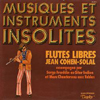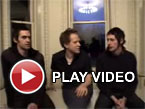Jean Cohen-Solal, "Flutes Libres & Captain Tarthopom"
 One would think the novelty market would have fortuitously unearthed all of the world's great flute masterpieces by now. Perhaps, though, there is still room in the annals for two more. In fact, the reason I even hesitate from declaring these the best two is for lack of really hearing any others. Regardless, it happened that in the early 70s, French flutist/bassist Jean Cohen-Solal recorded two largely unheard, flute-dominated records in which his seasoned psychedelic and progressive sensibility met the potent influence of avant-garde and classical ideas.MIO
One would think the novelty market would have fortuitously unearthed all of the world's great flute masterpieces by now. Perhaps, though, there is still room in the annals for two more. In fact, the reason I even hesitate from declaring these the best two is for lack of really hearing any others. Regardless, it happened that in the early 70s, French flutist/bassist Jean Cohen-Solal recorded two largely unheard, flute-dominated records in which his seasoned psychedelic and progressive sensibility met the potent influence of avant-garde and classical ideas.MIO
The music produced is as compelling today as it surely must have been at the time of its creation. Flutes Libres and Captain Tarthopom are both arranged in ways that neatly showcase Cohen-Solal talents as an arranger, an improviser, and a tremendously expressive flutist. Flutes Libres begins with the somewhat generic psych of "Concerto Cyclique," a lengthy track that does little but test Cohen-Solal's chops, expansive enough to allow him spastic runs peaking in squalls I thought only saxophones could produce. "Raga Du Matin" is more interesting, dipping into relaxed Eastern territories reminiscent of some Agitation Free and Incredible String Band material. The album's fourth and closing track, however, is the real treasure. Largely atmospheric in composition, "Quelqu'un" is a craggy landscape of organ and theremin-sounding swells, possibly all effected flute sounds, scattered with untraceable howlings, strange drippings, and spooky tinkerings. Flute-blown flourishes and rattled, absently plucked strings rise and fall across the song's 17 minutes, creating a mood that in its dark majesty anticipates the work of artists like Nurse with Wound. (Steven Stapleton is an admitted fan.) Listening straight across, it's hard to notice where Captain Tarthopom begins; the album's first strains are chiming bells inaugurating Cohen-Solal's journey into rich, if less experimental, psychedelic terrain. While these songs do not allow the flutist space to drift as freely as he had on his previous effort, experimentation among different instruments and sounds has increased. The title track opens with a martial brass section rising confidently from an abstract background of bell tones and winding, clicking sounds, similar to the way Albert Ayler's horn rises from chaos. The squawking, chicken-like found sound that ends "Captain Tarthopom" is the first of dozens of unlikely sounds to grace the album's jubilant, flute-driven psych; muffled voice fragments and noisy clatter create a welcome counterpoint to the solid groove of several tracks. Captain Tarthopom's centerpiece comes with "Memories d'un Ventricule," a song whose surrealistic title gives hint at the mayhem to follow. The music picks up where "Quelqu'un" left off, a potent atmosphere of slicing flute whine, organ pulse and operatic vocals, punctuated this time by tribal drum bits and bass roar. A classical reserve is present in this track and most of this second album, denying it Flutes Libres' raw appeal, though allowing for a listening experience equal in its expressive power and even superior in its variety of mood.
samples:



